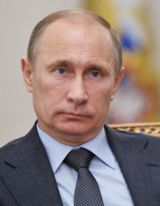Vladimir Putin appears well on his way to reclaiming the Crimea for Russia, restoring the peninsula to a status forfeited by Nikita Khrushchev’s Soviet Union in 1954. But this territorial achievement may provide only temporary distraction for Russia’s 140 million people who have seen their quality of life deteriorate dramatically since Putin took power in 1999.
In an important new book “Russians, The People Behind the Power,” former NPR Moscow correspondent Gregory Feifer depicts a society with a thin crony capitalist veneer that is increasingly afflicted by corruption, alcoholism and other social ills. While none of these are new for Russia, what is surprising is that they have gotten so much worse under Putin.
Although Putin is far more disciplined than the man who anointed him — Boris Yeltsin, a heavy drinker who came to personify Russia’s loss of status following the dissolution of the Soviet Union in 1991 — the system Putin has put in place is, Feifer writes, “far more corrupt and inequitable … than anything seen under Yeltsin.”
While Moscow dazzles with new restaurants, boutiques and nightclubs patronized by a privileged elite, the countryside crumbles and the business environment is increasingly distorted by corruption. According to Feifer, the bribes ordinary businessmen must pay simply to operate have increased more than six-fold from an average $23,000 a year when Putin took office to $135,000. Corrupt officials and oligarchs have spirited much of this cash abroad; Feifer cites figures of between $49 billion and $70 billion in capital flight each year.
Corruption crushes innovation except in the literary world, where Putin’s authoritarianism has sparked new work as Soviet oppression once stimulated remarkable underground art. Otherwise, the Russian economy is all about taking – exploiting Russia’s still ample natural resources instead of making products that anyone would want to buy.
Most depressingly, rule of law remains as — if not more — elusive than in communist or tsarist times. The recent introduction of jury trials means little in a system where those acquitted can be repeatedly retried by the state and anyone who falls afoul of the Kremlin can be jailed on flimsy charges or sent to languish in Siberia.
Watchdogs brave incredible risks and pay the price: a dozen journalists have been killed under Putin’s reign.
Russians are coping as they have historically – dulling their senses with alcohol. While life expectancy for men has improved slightly from 59 after the collapse of communism to 64, that still puts Russia 166 in the world, one rung above Gambia. The World Health Care organization ranks Russian health care at 130, a precipitous slide from the low 20s in the 1970s.
Alcohol kills one out of five men who die in Russia each year; Russian males consume a staggering 35 liters – almost 10 gallons – of pure alcohol a year according to Feifer. Tuberculosis – often contracted in prison — kills 20,000 people annually compared to only 500 in the US, which has twice the population. HIV-AIDs is the third cause of early death, with at least 700,000 registered cases. Because of the high death toll for men, women outnumber them by more than 10 million. Russian women also suffer disproportionately from domestic violence.
These depressing statistics reflect a society that has failed to rebuild even a tattered social security net despite billions gleaned from oil and natural gas. Of course, much of that revenue lines the pockets of officials close to Putin instead of being put to productive use.
Feifer compares Russia’s president – whose current term runs to 2018 and who may run again, giving him a reign longer than Stalin’s — to a mafia don who doles out favors and arbitrates between competing henchmen, making sure to target old allies occasionally to keep everyone else off balance.
Unfortunately, what happens in Russia does not stay in Russia but has implications for Russian foreign policy. Feifer reminds readers of how Putin re-asserted control in 2008 over two enclaves once attached to Georgia and why Putin is so resistant to regime change in Syria, Russia’s only remaining ally in the Middle East.
Anti-Americanism is a default position for Putin, once a mid-level KGB operative, and is likely to intensify if the Barack Obama administration imposes severe penalties on Russia for its imminent re-absorption of Crimea.
Feifer’s book helps illuminate the deep insecurity behind Russia’s hardball foreign policy. “Good things rarely come from the feelings of insecurity that go together with those of inferiority,” he writes. “In Russia’s case, those feelings …often prompt defensive posturing and sometimes, as in the war with Georgia, dangerous aggressiveness.”
Feifer, who wrote this book before the latest crisis in the Ukraine, advises the United States to try to integrate Russia into the international community where possible but to “make clear that Western countries will stand up for their values.”
Ironically, it was Russia’s disastrous showing in the Crimean War of the 19th century that ushered in much-needed domestic reforms, such as the abolition of serfdom. It is difficult to see how this latest series of events in Crimea will persuade Russia to act as a constructive actor on the international stage while it becomes increasingly dysfunctional at home.
Barbara Slavin is a senior fellow at the Atlantic Council’s South Asia Center and a correspondent for Al-Monitor.com, a website specializing in the Middle East. She is the author of a 2007 book, Bitter Friends, Bosom Enemies: Iran, the US and the Twisted Path to Confrontation, and is a regular commentator on U.S. foreign policy and Iran on NPR, PBS, C-SPAN and the Voice of America.
